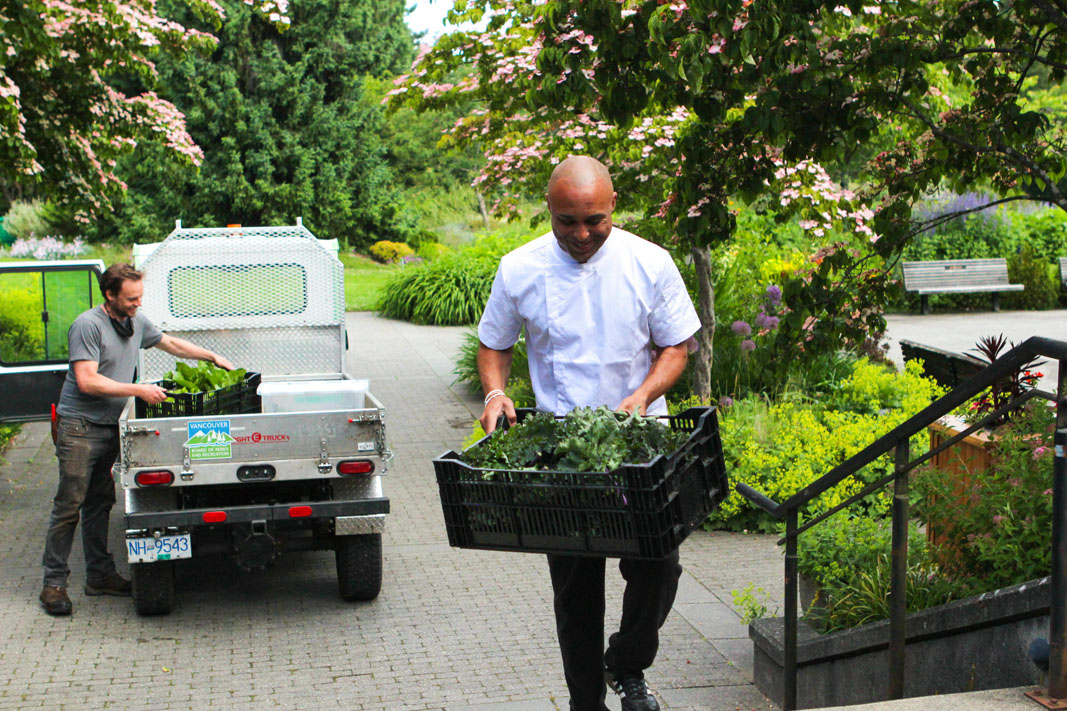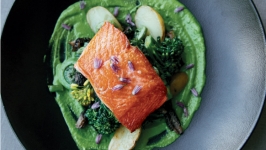From Botanicals to Edibles
Along with fifty-five acres of grass meadows, lakes teeming with water lilies, sunflower fields, woodland walks, a rosarium and hydrangea grove, VanDusen Botanical by the end of this year’s growing season, will have harvested more than 1,361 kilograms of fresh produce. Making a significant impact on the lives of thousands of Vancouverites currently experiencing food insecurity, the large vegetable garden located next to the tourist attraction’s popular hedge maze is, clearly, no ordinary veggie patch.
Matthew Phillip, executive chef of VanDusen’s Shaughnessy Restaurant, will receive 25 per cent of the vegetables grown this year. A believer in working with what you have available, he’s always used the botanicals and herbs abundant throughout VanDusen’s property to create unique menu items. Geranium raspberry jam or lemon verbena milkshakes are just a couple of his unique flavour concepts. This year, using the freshly supplied produce, menu items such as cedar-planked salmon with a kale and turnip chickpea fritter and smoked tomato relish were served as part of the restaurant’s Taste the Garden series.
Phillip is clear that despite the restaurant receiving the produce free of charge, a percentage of its market value is returned to the community through donations to the Vancouver Neighbourhood Food Networks (VNFN) — a group of community organizations whose goal is to improve access to healthy, affordable and nutritious food for everyone.
The remaining seventy-five per cent of the harvest has been given, in weekly increments, to Gathering Place Community Centre. Located in Vancouver’s downtown south region, the centre’s cafeteria program provides breakfasts, lunches and dinners daily to those on low incomes, people with disabilities, vulnerable youth, seniors and Vancouver’s homeless population.
Diane Brown, the centre’s food coordinator, calls the VanDusen produce a “godsend.” She says that spending less on fresh vegetables allows them to buy a better quality of fish or butter instead of margarine, adding that she hopes the program continues.
This isn’t the first foray into vegetable gardening for VanDusen.
Originally located near the entrance of the Shaughnessy Restaurant, in 2006, a small family-sized organic vegetable plot was relocated to its current and larger home. The garden’s increased capacity created more educational opportunities, and staff continue to develop new themes each year, highlighting food sustainability and practices. One year, a replica of a hundred- year-old vegetable garden raised awareness about the Ark of Taste. Under the auspices of the Slow Food Foundation, which defends local food traditions and biodiversity, the ark travels the world, cataloguing and creating a collection of heritage fruits and vegetables, many of which could disappear in a few generations due to climate change.
The 2021 theme “Eat a Rainbow” featured colourful vegetables such as zucchini, different varieties and colours of kale, and cabbage, beets, radishes and tomatoes. Signage informed visitors about the health benefits of each group, and children’s day camps further added to the educational impact of the vegetable garden.
“The more time students spend getting their hands dirty in the garden, noticing the small details that make a garden of food grow, the more they feel connected to the food they eat, and they share this knowledge with their families,” writes Chantal Martin, VanDusen’s director of education.
It’s not just vegetables VanDusen is cultivating. Next to the onions, squash and carrots, a burgeoning apple orchard has replaced mature fruit-bearing trees bred in Eastern Canada. Unsuited to the West Coast’s wet climate, these varieties were prone to disease and pests. Newer trees were planted from cuttings donated by John and Josephine Riley off their 100-year-old orchard on Bowen Island. The varieties represent trees brought to southern B.C. before the World War I. Tags depict their history and how to enjoy the fruits' unique flavours: fresh, baked or made into cider. Planting trees resilient to the region’s climate is another example of VanDusen’s commitment to food sustainability.
Once the trees start producing apples, Phillip will undoubtedly add them to his menu. For now, he’s preserving this summer’s bounty using vinegar, oils, drying and fermentation.
“My philosophy, as a chef, really involves the sustainability of food and equal access to it, and if this creates social change and I can inspire everybody to use their urban gardens, we can all reduce a carbon footprint and reduce hunger,” Phillip says.
For 40 years, Vancouver Board of Parks and Recreation and Vancouver Botanical Gardens Association, joint operators of VanDusen, have imagined the popular tourist attraction as being treasured locally and internationally recognized for plant conservation, education and science. This year, the vegetable garden not only raised awareness about food sustainability and insecurity but put Phillip’s philosophy into practice.
VanDusen Botanical Gardens
5151 Oak St., Vancouver
vandusengarden.org | @vandusengarden







